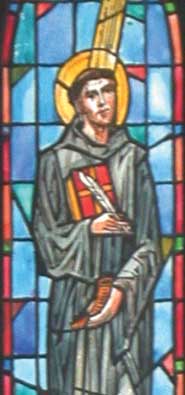Article #22
“Grant me to come at length to yourself, the fount of all wisdom.” The Venerable Bede (<em>ca.</em> 672–735), in <em>Ecclesiastical History of the English People.</em>

Bede by J & R Lamb Studios
To come at length to yourself
Dressed in a gray tunic and scapular, a Benedictine monk labors to complete a book. This monk is about fifty-nine years old. His entire life since the age of seven has been spent in monasteries. That is when his family sent him from home to begin his education with Benedict Biscop. According to his own account, he has been happy, and he loves to write and teach.
Bede’s works are numerous, but posterity will consider the book he is finishing today his masterpiece: Historia ecclesiastica gentis Anglorum (Ecclesiastical History of the English People). It will earn him a nickname long remembered—“the Father of English history.”
By comparison with other historians of those times, Bede is a meticulous researcher who takes pains to document his sources when he can. Although his accounts of events which took place before 596 contain a good deal of legend, he bases them on biographies, chronicles, and letters. He can do so because his monastery possesses a large library for that day—at least three hundred books collected by its founder, Benedict Biscop—and Bede is thoroughly acquainted with them all. His sources include papal letters, as well as his own observations.
Bede is a saintly man. As he completes his history, he writes on the last page, “I pray you, noble Jesus, that as you have graciously granted me joyfully to imbibe the words of your knowledge, so you will also of your bounty grant me to come at length to yourself, the fount of all wisdom, and to dwell in your presence forever.”
A letter written by his students after his death, which will occur four years later, shows that he was greatly beloved by them. They remark that he rejoiced in the prospect of heaven and, despite breathing problems, died chanting praises to God. Because of this sweetness of character, all Christendom will also know him by a second nickname: “The Venerable Bede.”
—Dan Graves
Dig a Little Deeper
- Asimov, Isaac. “Bede.” Asimov’s Biographical Encyclopedia of Science and Technology; the Living Stories of More than 1000 Great Scientists from the Age of Greece to the Space Age, Chronologically Arranged. Garden City, New York: Doubleday, 1964.
- Bede. A History of the English Church and People [Ecclesiastical History of England]. Harmondsworth, Middlesex, England: Penguin, 1968.
- “Bede or Baeda.” Dictionary of National Biography, edited by Leslie Stephen and Sidney Lee. London: Oxford University Press, 1921 – 1996.
- “Bede, St.” The Oxford Dictionary of the Christian Church, edited by F. L. Cross and E. A. Livingstone. Oxford, 1997.
- “Bede, the Venerable.” Dictionary of Scientific Biography; edited by Charles Coulston Gillispie. New York: Scribner, 1970 – 1980.
- Blair, Peter Hunter. The World of Bede. London: Secker and Warburg, 1970.
- D’souza, Dinesh. The Catholic Classics. Huntington, Indiana: Our Sunday Visitor, 1986.
- Kunitz, Stanley L. British Authors Before 1800: A Biographical Dictionary. New York: H. W. Wilson, 1952.
- Thurston, Herbert. “The Venerable Bede.” The Catholic Encyclopedia. New York: Robert Appleton, 1914.
Next articles
Article #23: All glory, laud, and honor
Theodulf of Orléans (ca. 760–821), in “All Glory, Laud, and Honor.
Article #24: We did not know where we were
Russian Ambassadors (987), in a report to Prince Vladimir of Kiev.
Article #25: You exist so truly, Lord
Anselm (1033–1109), in Proslogion.
Article #26: God wills it!
Franks at Clermont (1095). Shouted in response to Pope Urban II.



